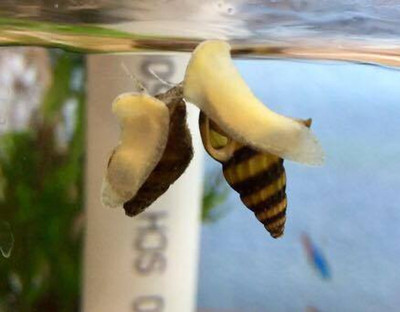Assassin Snails
Posted by Max Gandara on on 17th Jul 2024
Assassin Snails: Nature's Pest Control for Freshwater Aquariums
Assassin Snails (Clea helena) are fascinating and efficient creatures that have gained popularity among aquarists for their ability to control unwanted snail populations in freshwater tanks. These snails are not only functional but also add an interesting dynamic to the aquarium ecosystem. In this blog, we'll delve into the world of Assassin Snails, covering their origins, care requirements, behavior, and interesting facts.
What Are Assassin Snails?
Assassin Snails are freshwater snails native to Southeast Asia, particularly in countries like Indonesia, Malaysia, and Thailand. They belong to the Buccinidae family and are known for their predatory behavior, preying on other snails and small invertebrates. Their unique hunting habits and attractive appearance make them a valuable addition to many aquariums.
Appearance
Assassin Snails are easily recognizable by their distinctive appearance:
- Size: These snails typically grow to about 1-1.25 inches (2.5-3 cm) in length.
- Coloration: They have a striking black and yellow striped shell, which is conical in shape. This coloration not only makes them stand out but also helps them blend into the substrate, providing camouflage while hunting.
- Body: Their bodies are usually a pale yellow or cream color, extending a long, siphon-like tube from the front of their shell for breathing and sensing prey.
Tank Requirements
Providing the right environment is crucial for the well-being of Assassin Snails. Here are the key tank requirements:
Tank Size and Setup
- Tank Size: A minimum tank size of 10 gallons is recommended for keeping a small group of Assassin Snails. Larger tanks can accommodate more snails and provide a more stable environment.
- Substrate and Decorations: Use a soft substrate like sand or fine gravel, as Assassin Snails like to burrow and hunt for prey. Include plenty of plants, rocks, and driftwood to create hiding spots and replicate their natural habitat.
- Plants: Live plants can be included, as Assassin Snails do not typically harm them. Plants also provide additional hiding spots and enhance the overall aesthetics of the tank.
Water Conditions
- Temperature: Maintain a stable water temperature between 75-80°F (24-27°C).
- pH Level: Assassin Snails prefer slightly acidic to neutral water, with a pH range of 7.0-8.0.
- Hardness: They thrive in moderately hard water, with a general hardness (GH) of 5-15 dGH.
Filtration and Maintenance
- Filtration: Use a high-quality filtration system to keep the water clean and well-oxygenated. Regular water changes are essential to maintain optimal water quality.
- Water Changes: Perform regular water changes (20-30% weekly) to ensure a healthy environment for your snails.
Diet
Assassin Snails are carnivorous and primarily feed on other snails, making them an excellent solution for controlling pest snail populations in your aquarium. In the absence of enough prey, you can supplement their diet with:
- Protein-Rich Foods: Offer frozen or live foods such as bloodworms, brine shrimp, and other meaty foods.
- Pellets: Sinking pellets or wafers designed for carnivorous fish and invertebrates can also be provided.
Behavior and Compatibility
Assassin Snails are generally peaceful and can be housed with a variety of tank mates. However, they should not be kept with species they might prey on, such as small snails or slow-moving invertebrates. Suitable tank mates include:
- Small to medium-sized fish that are not aggressive
- Other non-predatory snails that are too large to be preyed upon
- Shrimp (with caution, as they might occasionally prey on smaller or weak shrimp)
Breeding Assassin Snails
Breeding Assassin Snails in captivity is relatively straightforward:
- Tank Setup: No special setup is required for breeding. They will breed readily in a well-maintained tank with adequate food supply.
- Eggs: Female Assassin Snails lay single, translucent eggs on hard surfaces such as rocks, driftwood, or plant leaves.
- Hatching: The eggs will hatch in about three to four weeks, and the baby snails will begin to hunt for food immediately.
Interesting Facts
- Efficient Predators: Assassin Snails are known for their efficiency in controlling pest snail populations, making them a natural and effective solution for snail overpopulation problems in aquariums.
- Nocturnal Hunters: These snails are primarily active at night, using their siphon to detect prey in the substrate and ambush them.
- Long Lifespan: With proper care, Assassin Snails can live for up to two years or more in captivity.
Assassin Snails are not only a practical addition to freshwater aquariums for their pest control abilities but also an intriguing species that can add diversity and interest to your tank. Their striking appearance, unique behavior, and ease of care make them a valuable asset to any aquarist. By providing the right environment, diet, and tank mates, you can enjoy the benefits and beauty of Assassin Snails for many years.

